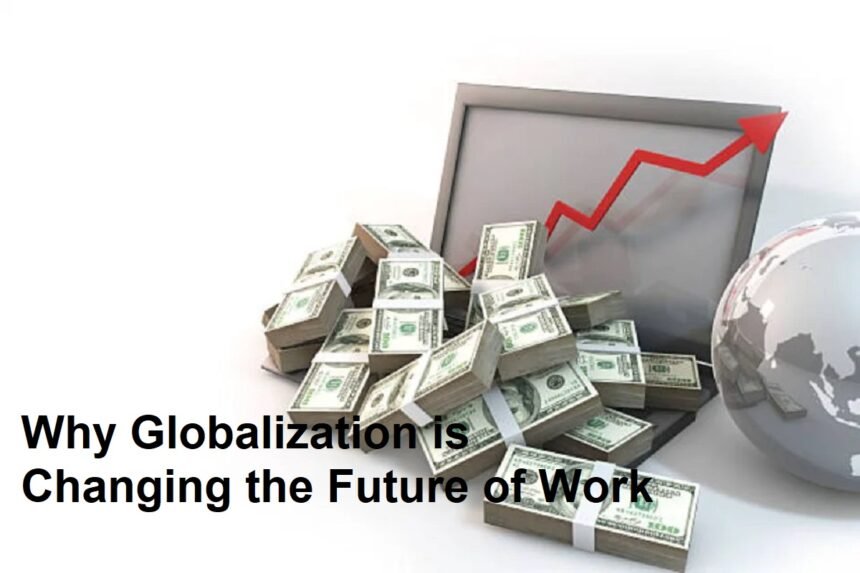Introduction
The workplace is evolving faster than ever before. Thanks to technology, global trade, and shifting economic patterns, the globalization economy is redefining what it means to work, collaborate, and build a career. Where jobs used to be tied to geography, today they’re increasingly influenced by international markets, outsourcing strategies, and digital tools that connect talent worldwide.
This article will break down how globalization is shaping the future of work, what challenges and opportunities it creates, and most importantly, how you can adapt to thrive in this new landscape.
The Globalization Economy and Work
What Does Globalization Mean for Jobs?
At its core, globalization connects economies, businesses, and workers across borders. Companies can now hire the best talent from anywhere in the world, while workers can access jobs beyond their home country. This shift has opened doors for growth but also brought challenges like job competition and economic inequality.
From Local to Global Labor Markets
Traditionally, most people competed for jobs within their city or country. Now, with the global labor market, you might be competing with someone halfway across the globe for the same role. On the flip side, it also means your skills could land you opportunities in industries or countries you never imagined.
Outsourcing: A Double-Edged Sword
Why Companies Outsource
Outsourcing is one of the most common ways globalization affects work. Businesses outsource tasks or entire departments to reduce costs, improve efficiency, and access specialized skills. For example:
- Tech companies outsource software development to countries with strong IT talent.
- Customer service centers are often based in regions with lower labor costs.
Pros and Cons of Outsourcing
- For Businesses: Lower operational costs and access to skilled labor.
- For Workers: More job opportunities in outsourcing hubs, but job displacement in higher-cost regions.
How to Stay Competitive
If your job risks being outsourced, focus on skills that are harder to replace—such as leadership, problem-solving, and creative thinking. Workers who adapt and reskill tend to fare better in a globalized economy.
The Rise of Digital Work
From Offices to Online Platforms
One of the biggest shifts in the globalization economy is the explosion of digital work. Remote work, freelancing platforms, and digital collaboration tools have made it possible to work from anywhere.
- Platforms like Upwork and Fiverr allow freelancers to compete globally.
- Remote-first companies hire employees from dozens of countries.
- Digital nomads are blending work and travel like never before.
Benefits of Digital Work
- Flexibility in location and hours.
- Access to global clients and employers.
- Opportunities for niche skills that may not be in demand locally.
Challenges of Digital Work
- Increased competition in online job markets.
- Need for strong digital skills and self-management.
- Time zone differences and cultural barriers in global teams.
Global Labor Trends to Watch
More Skills, Less Borders
Employers are no longer bound to local talent pools. They can hire globally, which means employees must continuously upskill to stay relevant. Skills in technology, communication, and cultural adaptability are in especially high demand.
Wage Pressure and Inequality
Global labor competition sometimes pushes wages down, especially in industries where work can be easily outsourced. However, highly skilled workers—especially in digital industries—often see higher pay because of global demand.
Cross-Cultural Collaboration
With global teams becoming the norm, workers must develop cultural intelligence to avoid misunderstandings and work effectively with colleagues from different backgrounds.
Practical Tips: How to Thrive in the Globalization Economy
For Workers
- Focus on Lifelong Learning – Constantly update your skills, especially in digital tools, data, and communication.
- Build a Digital Presence – Create a strong LinkedIn profile, personal website, or portfolio to showcase your work to global employers.
- Learn Cultural Competence – Being able to work across cultures is now a career advantage.
- Specialize – Jobs that require creativity, critical thinking, or specialized expertise are less likely to be automated or outsourced.
For Businesses
- Use Outsourcing Strategically – Outsource tasks that can save costs but keep core functions in-house to protect quality.
- Invest in Global Teams – Provide training and tools that help employees collaborate across borders.
- Support Flexibility – Embrace digital work trends to attract global talent.
Outsourcing vs. Digital Work: What’s the Difference?
It’s easy to confuse outsourcing and digital work, but they are not the same.
- Outsourcing: A company moves specific tasks or roles to another country for cost efficiency.
- Digital Work: Employees or freelancers work remotely, often independently, through online platforms or digital networks.
Both reshape the labor market but in different ways. Outsourcing is driven by businesses; digital work is often driven by individual workers seeking global opportunities.
Case Study: The Tech Industry
The tech sector shows how globalization is transforming work:
- Many companies outsource development to countries like India or the Philippines.
- Digital work platforms allow coders and designers to find global clients.
- Global labor shortages in cybersecurity and AI mean skilled professionals can command premium salaries no matter where they live.
This example proves that globalization doesn’t just cut costs—it also creates new opportunities for workers with the right expertise.
Looking Ahead: The Future of Work in a Globalized World
Short-Term Outlook
Expect more outsourcing as businesses continue to seek efficiency. Remote and hybrid work will remain a standard, with digital tools becoming even more advanced.
Long-Term Outlook
As automation grows, low-skill jobs may shrink, while high-skill roles in innovation, management, and creativity will expand. The global labor market will become more competitive, but also more rewarding for those who adapt.
The Key Takeaway
Globalization is not something to fear but something to prepare for. The more flexible and skilled you are, the more opportunities you’ll find in the new work landscape.
Conclusion
The globalization economy is transforming the way we work. From outsourcing and remote opportunities to the rise of digital work and evolving global labor markets, the future of work will look very different from the past.
For workers, this means being proactive—reskilling, embracing technology, and preparing for cross-cultural collaboration. For businesses, it means balancing cost efficiency with building sustainable, diverse teams.
The future of work is global, digital, and dynamic. The question isn’t whether globalization will shape your career—it’s how you’ll adapt to thrive in it.












